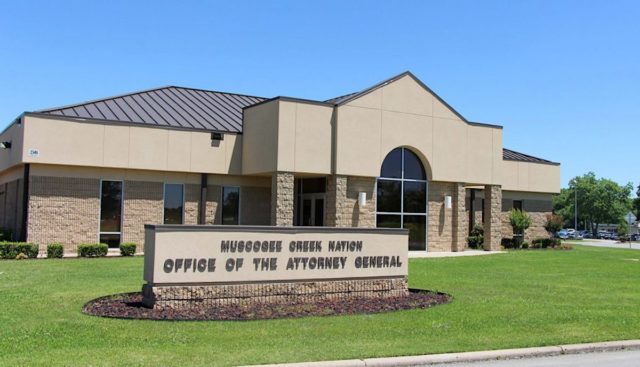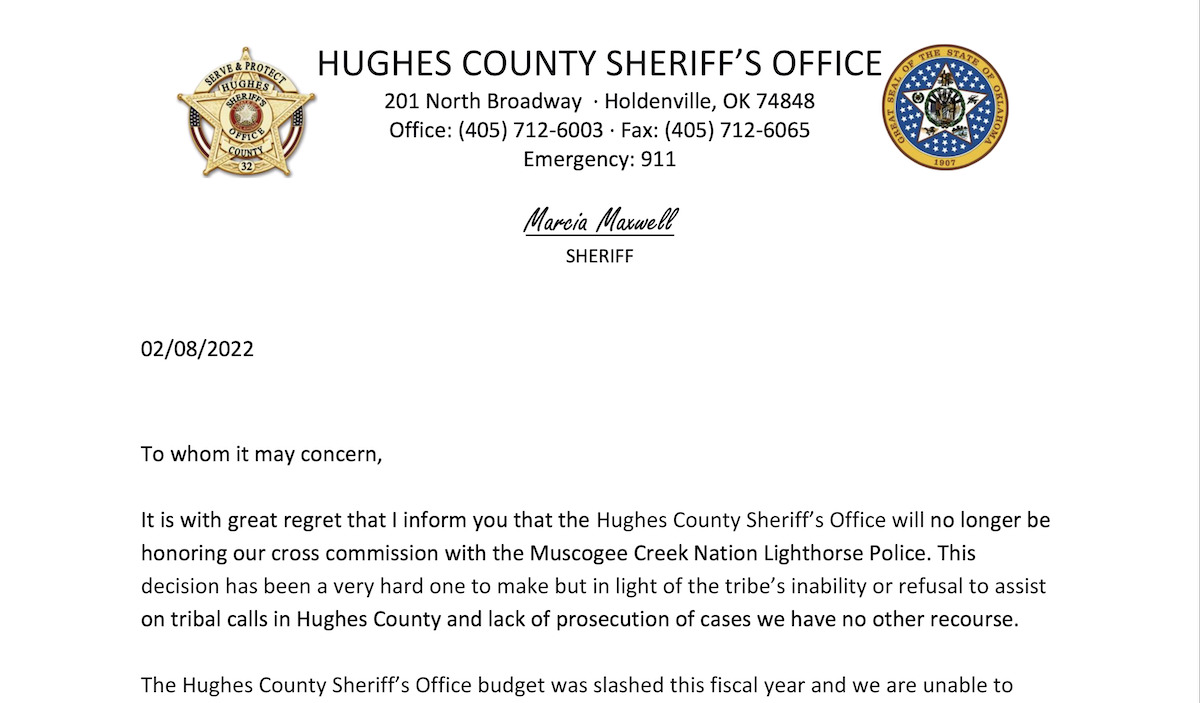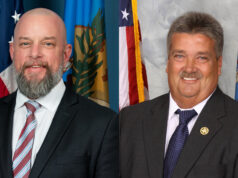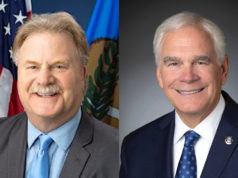

In responding to a letter from Hughes County Sheriff Marcia Maxwell stating that she was ending the county and the tribe’s cross-deputization agreement, Muscogee Nation Interim Attorney General Kyle Haskins wrote his own letter Feb. 15 extending an invitation to rebuild the relationship.
“Ending our cross-deputization agreement threatens the safety of victims, law-enforcement officers, and all members of the public in the substantial portion of Hughes County that is within our reservation,” Haskins wrote in his letter (embedded below).
Cross-deputization agreements allow tribal and non-tribal law-enforcement entities to cooperate across jurisdictional lines, meaning either agency can arrest and detain both native and non-native suspects before sorting out which court system will adjudicate the case.
Such agreements have been around for a long time, but they have become particularly important in the wake of the U.S. Supreme Court’s 2020 ruling in McGirt v. Oklahoma, which has led to the affirmation of large areas of Oklahoma as Indian Country reservations, where only tribes and the federal government have jurisdiction over major crimes involving tribal citizens.
Most of Hughes County, including the cities of Holdenville and Wetumka, falls within the Muscogee Reservation. The rest of the county to the south lies within the Choctaw Reservation.
Maxwell sent a letter ending the agreement with the Muscogee Nation on Feb. 8 over what she considered “the tribe’s inability or refusal to assist on tribal calls in Hughes County and lack of prosecution of cases.”
According to Haskins’ letter, the agreement was first established in the early 1990s and was last renewed in 2017.
‘Personal politics over public safety’
In his letter, Haskins questioned both the wisdom and practicality of ending the agreement.
“Your decision may also subject your officers to potential civil liability as they will not be protected by the good faith exception in the performance of their duties,” he wrote. “Furthermore, I cannot see how termination of a shared law enforcement agreement is a cost-saving measure for Hughes County. Irrespective of your decision, your duties remain unchanged. Any refusal of the Hughes County Sheriff’s Office to arrest suspects or aid our Lighthorse officers is a violation of their duty to the public and their oath as law-enforcement officers.”

Haskins also emphasized what he said would be a detrimental effect on public safety.
“For residents and visitors to Hughes County, the end of the cross-deputization agreement raises new concerns about what happens when a citizen calls 9-1-1 in need of a law enforcement response,” Haskins wrote. “Is it your plan to have 9-1-1 dispatchers terminate or transfer any emergency call based on questions regarding callers’ self-described racial identity? That would be an affront to all of us in law-enforcement who take an oath to serve all in the name of public safety.”
Haskins noted that the Muscogee Nation has established cross-deputization agreements with Holdenville and Wetumka, the two largest cities in Hughes County. According to data from the U.S. Census Bureau, 20.4 percent of Hughes County residents reported their race as only American Indian.
Haskins wrote that he hopes Maxwell will “reconsider [her] decision to put personal politics over public safety” and requested a meeting “so that we can discuss our desired continuation of the cross-deputization agreement.”
Haskins also stated that the Muscogee Nation is interpreting Maxwell’s Feb. 8 letter as a 60-day notice to terminate the agreement, instead of Maxwell’s decision becoming effective immediately.
“For our part,” he added, “the Muscogee (Creek) Nation Lighthorse Police is committed to continuing to dispatch officers in response to any public-safety emergency that comes to us on our reservation. Our primary concern is public safety — we will sort out the jurisdiction and adjudication issues once safety is addressed.”
‘Well aware of the legal ramifications’
Shortly after cancelling the agreement, Maxwell told NonDoc that her frustrations had been building for months and that the last straw was an incident in which Muscogee Nation officials did not show up to a scheduled meeting with her and Hughes County District Attorney Paul Smith.
Haskins addressed the incident in his letter, writing that he was “perplexed” that Maxwell had “omitted reference to the fact that you received direct, real-time communications from one of our Lighthorse captains who shared that the officers had been diverted en-route to your office to respond to emergency public-safety calls.”
In statement sent to NonDoc in response to Haskins’ letter, Maxwell said the tribal justice system was still to blame for the missed meeting. She wrote that Muscogee Nation officials were late because they were in pursuit of a man who was “bonded or was released by the tribal court” and stole a vehicle after his release.
“Had he had a high bond or no bond, whatever the case, that situation would have never occurred,” she wrote.
Maxwell sent her statement on Wednesday afternoon after being contacted for comment on Haskins’ letter, which had been sent to NonDoc directly.
At that time, she said she had yet to receive a copy of the letter herself. (Similarly, Haskins claimed in his letter that the Muscogee Nation first heard of the plan to cancel the cross-deputization agreement via media reports.)
RELATED
‘Just a mess’: Hughes County sheriff ends agreement with Muscogee Nation by Joe Tomlinson & Tres Savage
“The Hughes County Sheriff’s Office and our officers are well aware of the legal ramifications of our decision but we have also come to realize that we are spinning our wheels with the tribal courts,” Maxwell said in the statement.
She also said the Hughes County Sheriff’s Office has a good relationship with Muscogee Nation Lighthorse Police officers and that her grievances lie with “the tribal court system and their lack of prosecution as well as their lack of communication with the FBI and our office.”
Maxwell claimed that when cases are referred by tribal courts to the FBI and declined, those cases sent back to the tribes are being “overlooked” by tribal courts.
“We are compiling all of our incident reports that have been submitted to MCN in an effort to bring to light how many have gone to the wayside and never been prosecuted since McGirt took effect,” she wrote.
Maxwell said she was open to restoring the agreement but was not optimistic about it happening any time soon.
“We hope to mend relations with MCN but I do not foresee that happening until tribal courts start doing what they need to do and prosecute the criminals that are brought before their courts and protect the citizens that have been victims,” she wrote. “Our concern is not politically motivated, our concern is the safety and security of all of our citizens and as I have said before, we hope this situation can be rectified. At this point, the ball is in their court and we want to see them bring it to the table and show us that they can take on the monumental task that has been handed to them.”
Read Attorney General Kyle Haskins’ letter
